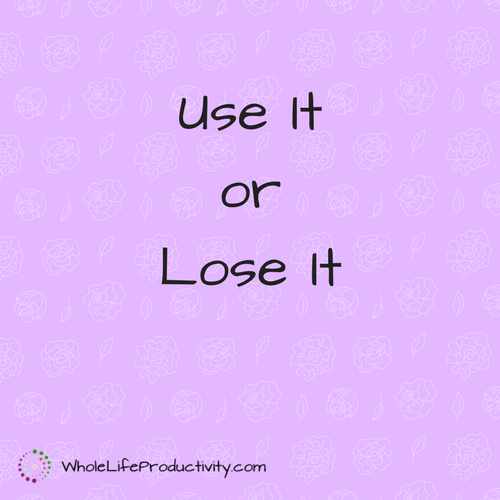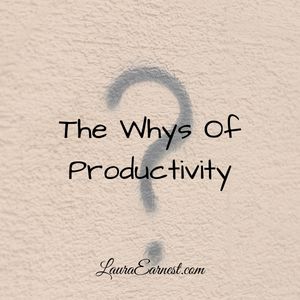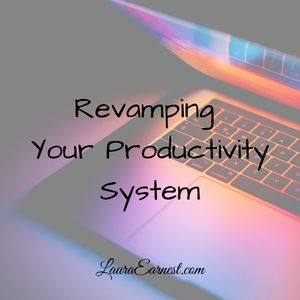
Use It Or Lose It
Most of us have heard the phrase “use it or lose it” when it comes to time off. But it can be applied in an effort to remove distraction from your life. Today we will explore five places to apply “use it or lose it” in the context of decluttering.
The Concept Behind Use It Or Lose It
Use it or lose it simply means you need to use what is hand, or it will be taken away.
If it is in reference to time off, you lose paid vacation that you have earned. Your company takes it away.
If it is in reference to stuff, it means that all things have a limited time when they can be used. You should take advantage of that time, or get rid of it.
My Decluttering Project
Near the end of 2017 I felt overwhelmed. It wasn’t just the schedule or the tasks, but also the weight of all my accumulated stuff that pressed down on me.
Stuff really does expand to fill all available space, and after 15 years in my house I have seen our level of possessions grow far too quickly.
So in January 2018 I embarked on a decluttering project. Flylady’s mantra of little at a time doesn’t work for me – long experience has shown that as I move stuff out, it just moves back in again in a different form. So I decided to give Marie Kondo’s method a try again. I had worked her modules on clothing and books (partially) in the summer of 2016, and I had been able to maintain that leve with little effort after that.
As of the writing of this article, I have moved through clothing and books completely and I am about 3/4 of the way through papers.
Use It Or Lose It
So here is where Use It Or Lose It applies to decluttering:
“Good” stuff
I was raised by parents who grew up at the tail end of the Great Depression in rural areas further depressed by poor economies. Both of my parents had the habit of saving things “for good.” There were special dishes, a special tea set, special clothes, special perfume, special jewelry. I absorbed this attitude and brought it with me unknowing into my own adulthood.
But things that aren’t used are just being hoarded. Too many people die with their things saved “for good” untouched.
So as I go through my things, I am aware of things that have that “for good” label attached. If they are not in regular use, then they are sent on their way to someone who will use them.
And that includes the “good” china – we are now using the dining room more frequently with those dishes.
If you’re not using something special, is it really all that special? Either get it into regular use, or let it go to someone who will use them.
Knowledge
Most specialized knowledge is not evergreen. Things that you learned in school, unless they are foundational things like math, have a limited application. They go out of date as things expire.
So as I went through our books, I looked at all my school books. Only those that had evergreen content (like linear algebra, basic algorithms, trig) were allowed to stay – and then only if I had needed the book in the past two years. Same with the books from my husbands master’s degree – all those books on the political climate of early century now are out of date.
If the knowledge is either out of date or not being used, pass it on to someone who can learn from it.
Clothing
Too many people hang on to a variety of sizes of clothing in their closet. They hope they will get back into that size again one day. And they very well might do it.
However by that time, those clothes that are hanging in the closet will be out of date.
If you’re not using the clothes, pass them on to someone who might use them before they go out of date.
Notes
I had gotten rid of all my class notes (or so I thought) a few years ago. But as I was going through my papers, I found all of the handouts and notes I had taken when I was pursuing my teaching license. Very little of the material was useful when I was teaching (because when you are “on” in front of a class, you can’t refer to a pile of notes for alternate methods); and it is of no use now that I have left education for IT.
Same with old notebooks. I ran across a few old journals that I skimmed through and promptly ripped apart and recycled. I will never use them again, and I certainly don’t want anyone else to use them either. 🙂
If you have notes that you haven’t looked at in six months or more, you’re not using it. And since they will probably be of no use to anyone else, go ahead and lose them to the recycling bin.
Manuals
Another legacy from my parents is that when you buy something, you need to hang on to all the instructions and warranties. I guess that made sense in an era where things were meant to last and papers were not easily replaced, e.g. before the Internet.
So having absorbed that attitude I tucked all the warranties and papers into five magazine holders in my closet. I had a task on my task list for almost three years to go through them and organize them. With Marie Kondo, though, I pulled it all out and started pitching things. It turns out I didn’t need to organize them. I needed to purge these papers that hadn’t been looked at in years. I ended up with five items – one to pass on to a co-worker for a device I had gifted him, three sets of instructions for cleaning items that are infrequently cleaned, and one receipt for paying a traffic ticket for expired tags.
Some of my manuals live in my cookbook place. And I use them because they tell me how to use the appliance to the best advantage. But anything else hadn’t been used since the days they were shoved into the files.
If you’re not referring to those manuals, lose them into recycling.
Memorabilia
One of the habits I ingrained when I first tackled simplifying my life (back in the early 2000’s) was that I don’t buy souvenirs that don’t have a purpose.
So rather than buying a fridge magnet at South of the Border, I bought a can coolie, which I use every time I drink soda. Instead of buying mouse ears at Disneyworld, I bought earrings. On a trip to Montreal, instead of a mug, I bought an umbrella (which was also useful at the time). Instead of buying an I Heart NY magnet or mug or sticker, I got myself an M&M blanket, which sits in my chilly writing studio.
None of these things have the typical souvenir branding; they just remind me of the trip when I use them.
Sadly, most houses I visit have memorabilia all over the place. It’s not useful stuff, it’s just collections displayed on shelves and horizontal surfaces. It doesn’t get used, it just sits and collects dust.
Most people don’t enjoy dusting. So why keep things that collect dust? If the memories are so important, take a picture of the item before you get rid of it.
Summary
If you are not using something, then all it is doing is taking up space in your environment and mind. If you are trying to lighten up (physically and mentally) and are decluttering, look at each item and ask if you are using it. If you are not, either start using it or get rid of it.




